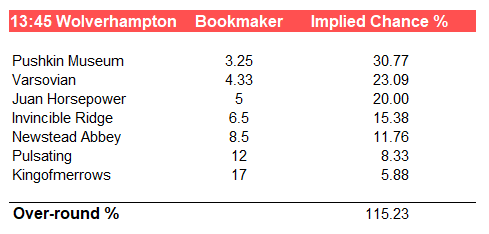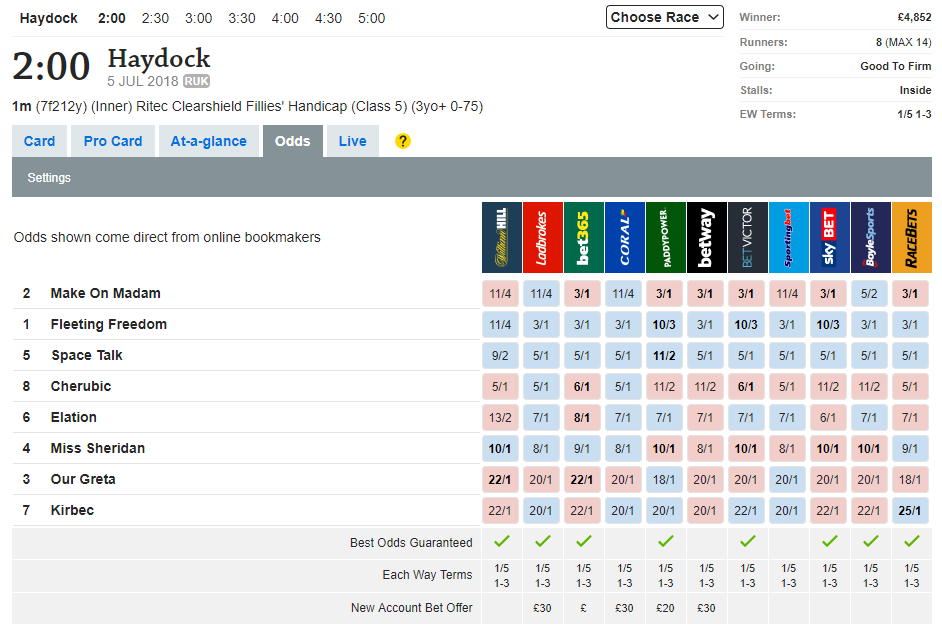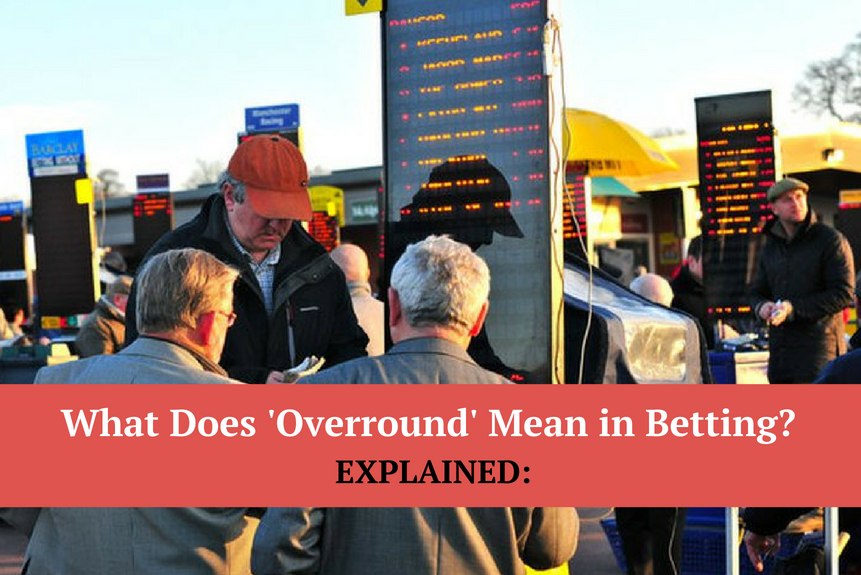Wondering what the over-round means in betting? How do betting odds work?
Don’t worry, this explanation article has all the answers…
Broken down into 5 main areas, betting over-rounds will be crystal clear:
- Over-round definition
- Bookmaker & betting exchange over-rounds
- Over-round calculation
- Why over-rounds are important
- Where to find betting over-rounds
Sound good? Let’s cover them all, one-by-one.
What Does ‘Over-round’ Mean When Betting?
Surprisingly, many every-day bettors don’t know the answer.
over-round is the term given to the total sum of betting odds within a singular betting market.
How the over-round is achieved is slightly more complicated. To do this we need to look into the mathematics of bookmaking (covered shortly).
The over-round figure is made up of each individual outcomes betting odds, inclusive of the betting markets profit margin. Depending on where you place your bets, this will vary.
Confused yet? Don’t worry, it will all come clear shortly. For now, you just need to know that the over-round is a number given to the combined betting odds on offer.
Bookmakers Over-round v’s Exchanges Overround…
First-time bettors may not realise there’s a difference. But there is, a HUGE one at that.
See the image from SMarkets below:

The white box on the right of the shot is highlighting the current over-round percentages.
On the left is the current lay odds over-round, and on the right is the current back odds over-round. Because when you think about it; they are two different books butted up against each other.
The closer the respective books are to 100%, the better (for anyone betting). This is because the probable chance of an entire betting market is 100%, something either happens or bets are void. Simple.
The reason all exchange odds do not total 100% is because of the small gap between pricing, known as the spread. For example, in the image above – the gap between 4.2 and 4.3.
So how do betting exchanges make their money? Commission.
On a betting exchange, users pay a small fee if they should win (2% on SMarkets at the time of writing).
Bookmakers operate in a very different way. They make their money by factoring a margin into the overall pricing – the over-round. This is why, you very rarely get a good price when using a bookmaker. There’s an example in a moment to make things clear, but bookmakers typically take a far bigger margin out of a betting market than any betting exchange would.
To compare bookmaker and betting exchange prices:

This over-round example was taken from Wolverhampton 13:45 horse race, on the 10th of May 18. To be fair, the bookies were offering better odds than usual in this example…
However, it doesn’t take a rocket scientist to see a significant difference in margins. Even when you factor in the exchange’s commission.
It’s an undeniable fact; bookmakers over-rounds suck! It’s also why you’re not likely to see a poor bookmaker.
Revealed: the Over-round Calculation
Okay, so there’s a tiny problem. Explained further in a moment but, bookmakers like to conceal their over-round percentages. It’s not necessarily right, but it’s just the way things are…
So if you should want to calculate the over-round yourself, we’re showing you the formula. To calculate the over-round you need to know the implied chance of each outcome. Once you have this, you simply need to combine all the figures.
Let’s go back to the previous example for clarity:

So, you can see Pushkin Museum’s decimal odds are 3.25 (9/4). This means the implied chance of Pushkin Museum winning is 30.77%.
How do you calculate this? Simple: 100 / 3.25 = 30.77%.
Once you have the implied chance of all your outcomes, add them together and you’ve calculated the markets over-round.
Don’t believe us? Add up all the figures in the right-hand column above.
Why is the Over-round Important For Betting?
Now you know what the over-round is, how it’s calculated and the difference between over-rounds with bookmaker and exchange. But why does it matter?
Because we want to win of course!
You see, if you want to win over the longer-term, you have to bet at a value price. The complete opposite of what the bookmakers are doing. To do this, you will need to find odds that are larger than their probable chance of happening. For example, you want to be betting on a horse at 7.0 (6/1) when it’s implied chance of winning is 20%. Because an implied chance of 20% means it should be a price of 5.0 (4/1).
When you think about it logically. Like everything else in life, you need to be getting some value.
There are several ways of doing this, but the easiest has to be through matched betting, fully explained here.
The quickest way to see if you are likely to lose is through looking at the books over-round. It’s simple maths, you can’t beat it…
A prime example would be the Grand National in April. Bookmakers always drastically increase their over-round for this, because they know people will bet on it anyway. The end result being – despite they pay out at big odds, they’re massively up. In recent years, we’ve seen over-round percentages of 140% on the grand national. Crazy.
Where Can YOU Find the Over-round?
Aside from calculating the over-round figures yourself, some places list them. Admittedly they’re not as public as they once were…
You used to be able to see all the bookmakers over-round percentages in comparison on places like the racing post and odds-checker. However, they seem to have been removed recently. But when you consider the special relationship the bookmakers have with these sites it’s hardly surprising.
I mean, I doubt Ladbrokes want a big sign under their column saying 118.61% over-round.

On the various betting exchanges, it’s easy, the over-round is listed on each market – like the smarkets example above.
Over-round Conclusion (Our Perspective)
The over-round is a great way of separating an invaluable market from others on offer. It’s just one way of noticing potential price movement in a digital world where over-rounds, value and betting odds move fast. However, it’s not the golden goose. You aren’t gone to simply make money because you noticed the over-round was lean… we would advise signing up for our matched betting tools if you’re looking to make a profit.
In truth, the use of betting over-rounds beyond simplistic value identification is for betting odds traders and the like. Slightly more complex, although not impossible to crack.
Before you go, we would like to know: Was this article of use to you? Would you like more like it?
Let us know below…


